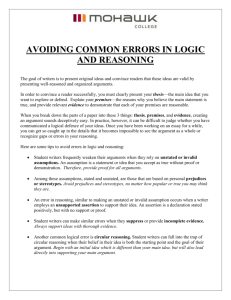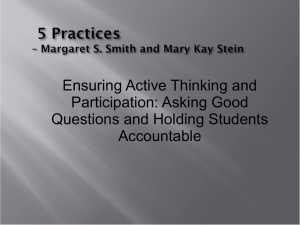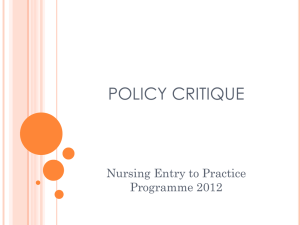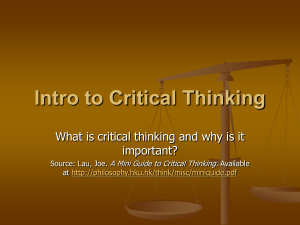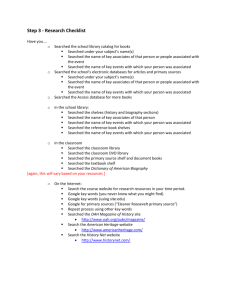Undertaking a Literature Review
advertisement
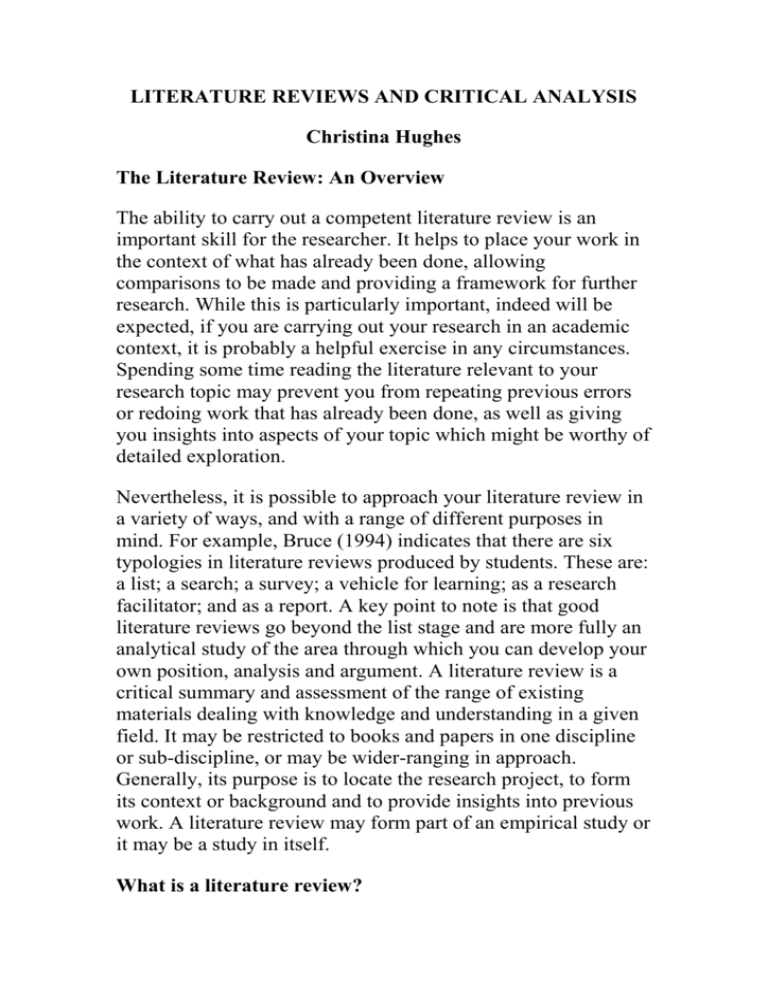
LITERATURE REVIEWS AND CRITICAL ANALYSIS Christina Hughes The Literature Review: An Overview The ability to carry out a competent literature review is an important skill for the researcher. It helps to place your work in the context of what has already been done, allowing comparisons to be made and providing a framework for further research. While this is particularly important, indeed will be expected, if you are carrying out your research in an academic context, it is probably a helpful exercise in any circumstances. Spending some time reading the literature relevant to your research topic may prevent you from repeating previous errors or redoing work that has already been done, as well as giving you insights into aspects of your topic which might be worthy of detailed exploration. Nevertheless, it is possible to approach your literature review in a variety of ways, and with a range of different purposes in mind. For example, Bruce (1994) indicates that there are six typologies in literature reviews produced by students. These are: a list; a search; a survey; a vehicle for learning; as a research facilitator; and as a report. A key point to note is that good literature reviews go beyond the list stage and are more fully an analytical study of the area through which you can develop your own position, analysis and argument. A literature review is a critical summary and assessment of the range of existing materials dealing with knowledge and understanding in a given field. It may be restricted to books and papers in one discipline or sub-discipline, or may be wider-ranging in approach. Generally, its purpose is to locate the research project, to form its context or background and to provide insights into previous work. A literature review may form part of an empirical study or it may be a study in itself. What is a literature review? • A literature review is a systematic, explicit and reproducible method for identifying, evaluating, and interpreting the existing body of recorded work produced by researchers, scholars, and practitioners. (Fink, 1998: 3) Initially we can say that a review of the literature is important because without it you will not acquire an understanding of your topic, of what has already been done on it, how it has been researched, and what the key issues are. In your written project you will be expected to show that you understand previous research on your topic. This amounts to showing that you have understood the main theories in the subject area and how they have been applied and developed, as well as the main criticisms that have been made of work on the topic. The review is therefore a part of your academic development - of becoming an expert in the field. (Hart, 1998: 1). · What are the key words that you should note from these quotations? The Questions that a Literature Review can answer · What are the key sources? · What are the major issues and debates about the topic? · What are the political standpoints? · What are the origins and definitions of the topic? · What are the key theories, concepts and ideas? · What are the epistemological and ontological grounds for the discipline? · What are the main questions and problems that have been addressed to date? · How is knowledge on the topic structured and organized? · How have approaches to these questions increased our understanding and knowledge? [Hart, 1998: 14] Planning a Literature Search · DEFINE THE TOPIC: Start with some general reading to familiarize yourself with the topic. Consult subject-specific dictionaries and encyclopaedias. Take notes on the concepts and note which authors are cited. Prepare a list of terms for searching, for example, of the library catalogue. Begin to think about the shape of the topic so that you can map it out at a later stage. · THINK ABOUT THE SCOPE OF THE TOPIC: Ask questions about which language or languages it might be necessary to search; what time frame, ie how far back you might need to search; and what subject areas might be relevant. Make a list of terms and phrases you will use to search: this is known as the search vocabulary. · THINK ABOUT OUTCOMES: Your proposal for your research will have stated an aim pertinent to the search and review of the literature. Think therefore about what it is you want to get out of the search and why you are undertaking a search in the first place. · THINK ABOUT THE HOUSEKEEPING: Design a means by which you will record what you find and how you will crossreference materials. It is important to keep consistent records not only of what you have searched but how you searched. This is because you may need to go back to undertake further searches of the same source using different terms. Your search might also be required to be written up as part of the methods by which you did your research. · PLAN THE SOURCES TO BE SEARCHED: Prepare a list of likely relevant sources of information such as encyclopaedias, OPAC and indexes. An interview with the subject librarian can be very useful at this stage. Also use guides to the literature which are discussed below to identify relevant sources to be searched. They will guide you to the most relevant material and possibly show you how to use some of the technology available. · SEARCH THE SOURCES LISTED: Work through the list of sources you have made. Start with the general sources, for example, encyclopaedias, moving on to abstracts and indexes. Be systematic and thorough, making consistent references as you go along. Make notes on possible further leads and ideas to be followed up. As each source is searched cross it off the list. (Adapted from Hart, 1998: 32) Critical Analysis: An Overview In everyday language, if someone is `critical', we may be referring to a dressing down or personal attack. In research terms, however, critical reading, critical thinking and critical assessment refer to a considered, though not necessarily balanced, and justified examination of what others have written or said regarding the subject in question. An important skill at the heart of these processes is the ability to recognise, analyse and evaluate the reasoning and forms of argumentation in the texts and articles that you will read. This skill is called critical reasoning. Developing a systematic approach to the analysis of the arguments of others is an essential research skill. What is Critical Analysis? • Reading academic material is not just about becoming an elegant reader who can grasp the overall sense of a piece, translate jargon in order to extract facts from a text, while taking notes efficiently. Ideally, readers should learn to engage with a text in a way which enables them to assess its worth - being critical is learning to assess the logic and rationale of arguments and the quality of the substantiating date ... it is being able to ask how important the flaws are, and so to weigh the worth of evidence. This means being able to ask questions of the text beyond what it means, what it is saying. (Peelo, 1994: 59) Critical reasoning is centrally concerned with giving reasons for one's beliefs and actions, analysing and evaluating one's own and other people's reasoning, devising and constructing better reasoning. Common to these activities are certain distinct skills, for example, recognising reasons and conclusions, recognizing unstated assumptions, drawing conclusions, appraising evidence and evaluating statements, judging whether conclusions are warranted; and underlying all of these skills is the ability to use language with clarity and discrimination. (Thomson, 1996: 2) · What are the key words that you should note in these quotations? What is Critical Reading? A critical reading is: · One that goes beyond mere description by offering opinions, and making a personal response, to what has been written; · One that relates different writings to each other, indicating their differences and contradictions, and highlighting what they are lacking; · One that does not take what is written at face value; · One that strives to be explicit about the values and theories which inform and colour reading and writing; · One that views research writing as a contested terrain, within which alternative views and positions may be taken up; · One that shows an awareness of the power relations involved in research, and of where writers are coming from; · One that uses a particular language (authors assert, argue, state, conclude or content) may be carefully qualified, and may use an impersonal voice. Critical Analysis: An Exercise · Exercise 1: Identifying arguments and conclusions For each of the following passages: · Decide whether it is an argument and if it is an argument say what the conclusion is 1. Before they start school, all children need to acquire many skills, for example, speaking, dressing, washing, identifying colours. Parents should be perfectly capable of teaching these skills. Instead of spending money on nursery education, we should spend it on educating people to become good parents. 2. Red squirrels can eat yes berries, hawthorn berries and rosehips. Grey squirrels can eat none of these. However, grey squirrels eat acrons which red squirrels cannot eat. · Exercise 2: Identifying someone else's assumptions Sometimes we may find it more difficult to identify the assumptions underlying our own reasoning than to identify the assumptions upon which others are relying. This exercise aims to make you more aware that there may be unstated beliefs in your own reasoning which others would wish to challenge. From the following list, choose a statement with which you agree and give your partner just one reason why you believe this. Your partner must then try to identify any unstated assumptions upon which your view depends 1. Smoking in public places should be banned. 2. Boxing is a barbaric activity 3. People should be allowed to hunt foxes 4. Coarse fishing is a pointless pastime. 5. The older one gets, the wiser one becomes. 6. Newly qualified drivers should not be allowed to drive on motorways. 7. The pattern of family life has changed in recent years. 8. Schools should be required to provide sex education. 9. Too many new motorways are being built. 10. It was a good idea to set up the National Lottery. · Exercise 3: Identifying assumptions in arguments Identify any `unstated' assumptions in the following: 1. Men are generally better than women at what psychologists call `target-directed motor skills', but what the rest of us call `playing darts'. Many people would say that this is not due to innate biological differences in the brain, but is due to the fact that upbringing gives boys more opportunities to practise these skills. But there must be some innate difference, because even three-year-old boys are better than girls of the same age at target skills. 2. Allowing parents to choose the sex of their children could have serious social costs. There would be a higher percentage of males who were unable to find a female partner. Also, since it is true that 90 per cent of violent crimes are committed by men, the number of violent crimes would rise. [Adapted from Thomson, 1996: Chapter 1] Review, Questions and Next Steps · Review This session has been designed to further your ideas about the literature review. In particular, it has introduced you to two aspects of this: · The literature review: definitions and planning · Critical analysis · Questions Make a note here of any questions that you now have. For example, what aspects of the literature review or critical analysis are you still not clear about? What has the material now prompted you to wonder about? · Next Steps What would you identify as your own personal learning needs that arise from this session? Who or what would you identify as a source of help in meeting your learning needs? How will you ensure that these learning needs are met? Reading List Blaxter, L, Hughes, C and Tight, M (1996) How to Research, Buckingham, Open University Press (also Second Edition 2001) Bruce, C (1994) Research Students' Early Experiences of the Dissertation Literature Review, Studies in Higher Education, 19, 2, pp 217-229 Hart, C (1998) Doing a Literature Review: Releasing the Social Science Research Imagination, London, Sage Fink, A (1998) Conducting Research Literature Reviews: From Paper to the Internet, Thousand Oaks, Sage Germov, J and Williams, L (1999) Get great info.rm@tion fast, St Leonards, Allen and Unwin Peelo, M (1994) Helping Students with Study Problems, Buckingham, Open University Press Thomson, A (1996) Critical Reasoning: A Practical Introduction, London, Routledge



